As music streaming apps evolve, it’s clear that they’re becoming smarter with every update.
Playlists now seem to know exactly what you want to listen to, almost before you do. This isn’t just a coincidence -it's AI in action.
Artificial intelligence is revolutionizing the way we experience music, turning it into a personalized, interactive journey for discovering new tracks and artists.
From generating playlists tailored to your taste to facilitating music composition, AI in music apps is pushing the boundaries of what’s possible.
It’s not just improving the experience for users; it’s reshaping the entire industry in ways that were once thought impossible.
Buckle up and find out more about it:
What is AI in Music?
AI in music apps is the use of smart algorithms and machine learning technology to enhance how we interact with music.
It drives everything from song recommendations based on your listening patterns to creating brand-new music entirely.
AI can review user data, listen for patterns, and even forecast what you may enjoy next.
Here's a fact that may catch you off guard: Over 60% of music streaming on sites such as Spotify is influenced by AI-based recommendations.
Yep! AI systems consider what you've been playing and recommend something similar, introducing you to new artists or songs you may not have noticed before.
It's all about designing an experience personalized just for you- effective, intuitive, and surprisingly accurate.
Music Stats reveal interesting data and show us how AI in music is not a far-fetched dream, it’s an ongoing shift:
-
- A significant 74% of online users increasingly depend on AI to find new music.
- A staggering 82% of listeners find it difficult to distinguish between songs produced by AI and those produced by humans.
- Increasingly, artists are using technology, with 60% employing AI tools in their music productions.
- AI is part of the music-making process for 20.3% of artists.
- AI has become part of the creative process for 36.8% of music producers.
We guess this is why investors want to create a music app and integrate AI- the perfect strategy to keep your app future-proof.
AI Evolution in Music Industry
Before knowing more, we are about to dive in to know the evolution of AI in music.
.webp)
How AI is Revolutionizing Music Apps?
AI in Music Apps isn’t just a trend: it’s the future many of us dreaming,
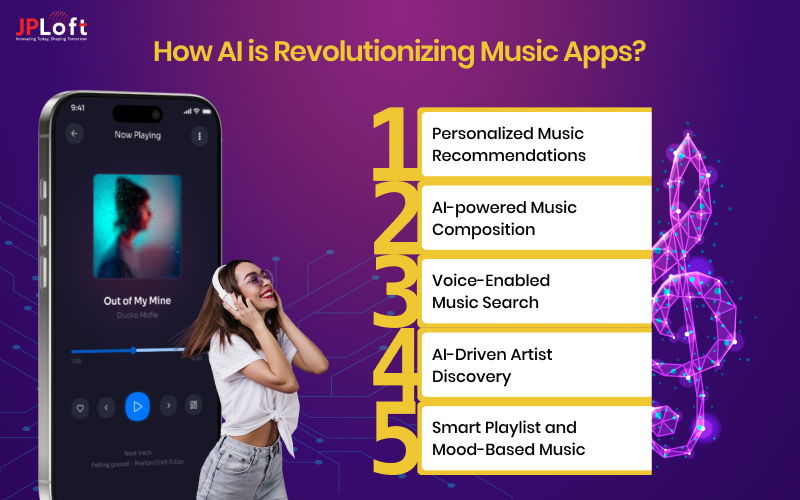
You need to understand the benefits of Artificial Intelligence in reshaping the music industry to get a grasp of the market and make decisions so as per that.
1. Personalized Music Recommendations
AI has changed how users discover new users, creating better experiences that go beyond simple playlists.
Earlier, people used to manually search for new music, but things have changed, thanks to AI in music.
Now, analyzing past interactions, search history, and favorite artists, a user gets suggested new music which saves them time and also makes the app look good.
The personalized recommendation is one of the biggest trends that is driving AI in different industries, and music is no exception.
It’s crazy to see how AI came into our lives a few years back and now the demand to create an AI app or having an AI Feature is going strong.
2. AI-powered Music Composition
You must have heard music from human artists a lot, but now get ready to hear tracks from AI.
Some apps are now using AI to help artists create music from scratch. Meaning from generating beats, and lyrics, to even full composition.
One such example of this is AIVA the app is totally killing it in the market by allowing people to generate music through AI in 250 styles.
If you’re keeping up with the latest music app trends, you’ll see this one is growing fast.
As it turns out, the future of music production is evolving, and AI is taking it ahead.
3. Voice-Enabled Music Search
Apps like Spotify and SoundCloud are changing our interaction with music.
Instead of searching or typing, users can now find the music they like with just a simple music command.
Having AI in music streaming apps adds an extra layer of convenience to improve the user experience.
It’s important to recognize that voice search capabilities are necessary for staying ahead in the competitive landscape, especially in an age where hands-free interactions are becoming the norm.
4. AI-Driven Artist Discovery
Well, about AI the great news is it is not just serving the users- but also driving innovation in artist discovery.
AI simply identifies emerging artists and suggests them to the right audience. This is how AI improves music discovery in apps.
Now is a great opportunity for music platforms to support upcoming talent, which can also help to provide more content to users.
Music app challenges are solved with AI help as it improves discoverability, so it is important to keep the platform fresh and relevant.
5. Smart Playlist and Mood-Based Music
AI takes personalization a step further by curating playlists based on mood, time of the day, or even the user’s current activity.
AI detects music genres and moods and engages users by offering them songs based on the mood at the right time.
This is a game changer- mood-based playlists are highly shareable, increasing app visibility and encouraging viral growth.
Although the technology might be heavy on the cost to develop a music app.
The benefits of AI in music apps are hard to ignore, but to truly tap into the market you need to know the technology behind the innovation.
Key AI Technologies Used in Music Apps
Understandably, Artificial intelligence and music go hand in hand nowadays.
After all, from discovering new tracks to creating personalized playlists, AI is playing an important role in improving
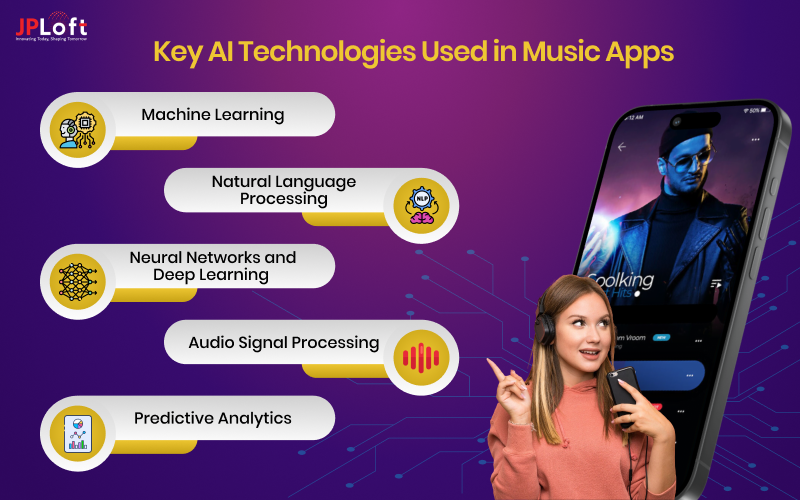
Get an understanding of the core AI technologies powering these innovations:
1] Machine Learning (ML)
Machine learning is the driving force of personalized music recommendations.
To understand it better, ML algorithms analyze user preferences to suggest new music. Over time, the app learns from their habits and improves recommendations.
If you’re thinking of creating an app like Spotify, machine learning will be essential for offering users custom-tailored playlists and discovering tracks they’ll love.
By leveraging AI in music, apps can ensure a unique and changing experience, keeping the user experience fresh & engaging.
2] Natural Language Processing
NLP is what makes voice search so effective in modern apps.
Music apps now understand given commands, thanks to AI and music integration. Users can simply command, “Play some POP” or “Find me the latest hits” and the app will deliver the right music instantly.
The benefits of AI in music here are clear- users get the fun of interacting without hands which boosts convenience, and engagement and retains users from going to your competitors.
3] Neural Networks and Deep Learning
Neural Networks and deep learning are powerful tools that enable music apps to analyze complex patterns in data.
This technology offers apps to understand subtle things like mood shifts in songs or even track user preferences that go beyond just their listening habits.
With Artificial intelligence and music working together, the app becomes smarter and more intuitive over time, offering users better suggestions.
As AI in the music industry evolves, we will see the evolution of these technologies too meaning they will become more responsive and better at understanding user needs.
4] Audio Signal Processing
Audio signal processing is a key technology in delivering high-quality sound which is a must-have for a music app.
It helps to provide better quality sound, adjust volume, and even create sound effects or remixes.
Whether you’re listening on a phone, tablet, or speaker, this ensures that users get the best experience possible.
By incorporating AI in music production, apps can make sure every aspect of audio quality is top-notch, which makes the impact of AI in music streaming apps undeniable.
It results in a smoother, richer listening experience that users love.
5] Predictive Analytics
Predictive analytics powers many of the “you might also like” recommendations you see in music apps.
By gathering data from past listening, AI can predict which songs or artists users are likely to enjoy next.
This is a game changer for AI in the music industry, as it continuously offers fresh music choices keeping users engaged.
With the help of song AI, music apps can retain users by offering a more personalized experience and maintaining their interest over time.
Got an understanding of how AI technologies play a major role in music apps? Time to know about some popular AI-powered music apps that you can look up to and how they are
Popular AI-Powered Music Apps in the Market: Drive Inspiration
AI is transforming the way we listen to music, making personalized recommendations and seamless interactions the new norm.
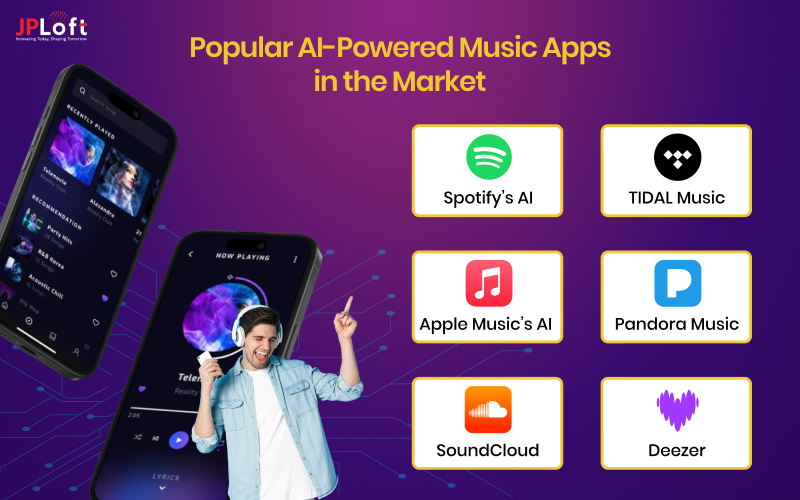
Here are some of the most popular AI-powered music apps that are leading this change and making the future of music streaming better than ever,
A] Spotify’s AI-Driven Recommendations
Spotify is a top name among the best music streaming apps.
Many reasons make it popular among users one of them is always staying ahead of the trends. This is why when people look to create an app like Spotify, they look for features that can help them make a mark in the market.
-
- AI Feature: Spotify uses machine learning algorithms like collaborative filtering and natural language processing to analyze user behavior and create personalized playlists such as “Discover Weekly” and “Daily Mix.”
- Impact: Over 500 million users benefit from hyper-personalized music recommendations, making Spotify no.1 in AI-driven music discovery.
B] Apple Music’s AI
Talking about trends and not including Apple Music will not do justice to the list.
When it comes to Apple, they only bring perfection to the market with top-tier iOS app development which is what Apple Music is.
-
- AI Feature: Apple Music integrates AI into the music app powering its “For You’’ section, offering tailored playlists and recommendations based on listening history.
- Impact: As a result, the “For You” section drives 60% of user engagement on the platform.
C] SoundCloud
SoundCloud is also a top name in the market which is why so many investors Google ”How to create an app like SoundCloud?”We don’t blame them.
After all, while staying ahead with innovation and trends it has gathered a loyal customer base.
-
- AI Feature: SoundCloud has AI to recommend tracks from top artists through its “Recommended Tracks” feature, helping independent musicians gain visibility.
- Impact: 40% of all streams on SoundCloud come from their AI-driven recommendation.
D] TIDAL Music
Heard of TIDAL Music? The top-notch audio quality is what separates the app from the crowd.
So many people who are in this industry look at this app as an inspiration to create more similar apps like TIDAL Music.
-
- AI feature: TIDAL uses AI to recommend high-fidelity tracks and playlists tailored to user preferences, with a focus on audiophiles.
- Impact: Its focus on high-quality audio has led to a 30% increase in premium subscriptions year over year. And, around 60% of users engage with AI-curated playlists monthly.
E] Pandora Music
Pandora Music is a pioneer in music apps.
With a focus on curated playlists and user-tailored experiences, Pandora has become a go-to platform for music lovers seeking a highly personalized listening journey.
-
- AI Feature: Pandora’s Music Genome Project analyzes over 450 attributes of a song to create customized radio stations.
- Impact: The Music Genome Project has analyzed 2 million songs to date. Users spend at least 23 hours per month on the platform, thanks to its highly tailored listening experience.
F] Deezer
Deezer stands out from the crowd for knowing what users want to listen to we call it the magic of personalized playlists.
Many have curiosity about how the app is doing well in the market.
-
- AI Feature: Deezer’s Flow creates a personalized playlist based on user preferences, while SongCatcheruses AI to identify songs playing around you.
- Impact: Flow accounts for 25% of all listening time on the platform. SongCatcher has identified 1 million songs for users, making Deezer a versatile and user-friendly music app.
If you find these apps inspiring enough and keep asking how to create an AI-powered music app, the next section is just for you where we share details in brief.
How to Develop an AI-powered Music App?
In the current age, where AI app development is at a time high, leveraging AI is not optional, it’s important to have.
AI in music is no longer a futuristic concept- it’s a reality changing how we create, discover, and experience music.
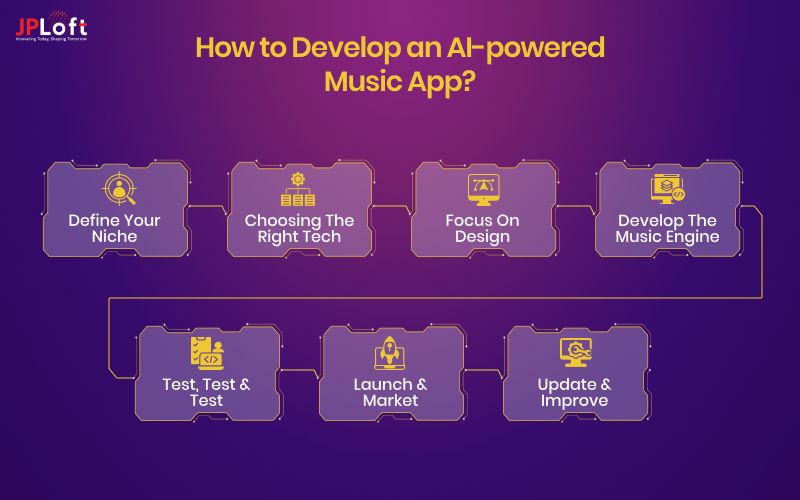
If you want to create, develop, or build an AI music app, then this guide is all you need.
► Start with a Bold Vision and Define Your Niche
Before jumping into code, think about what makes your app different.
Is it all about AI and music discovery or offering an intuitive way to help users create music using artificial intelligence in music?
Or, maybe your app will be a hub for music and AI tools for producers, allowing them to create AI-generated beats.
Whatever you choose, make sure it stands out. AI is transforming the music and machine learning space, so this is your chance to reform the way people engage with music.
► Choosing the Right Technology
The beauty of AI and the music industry is the wide variety of tech stack you can integrate.
You could use natural language processing to allow voice control, so users can just say, “Hey, play this track” and the app does the rest.
Or, go big with deep learning algorithms that analyze listening habits to offer dynamic, evolving playlists.
Think of AI in music app development not as a one-time trick but as the core of how your app gets smarter over time. This is where artificial intelligence and music collide to deliver a seamless experience.
► Focus on Design
An app isn’t just about technology-it’s also about user experience. So focus on app prototype and wireframe to ensure seamless and engaging design that aligns with user needs well.
A smooth UI/UX design is important, especially when incorporating AI.
All you have to do is make sure that users can access any feature they want easily through your app.
Plus, make sure to allow easy and smooth integration of your app with other platforms to develop an AI-music app that’s successful in the market.
By prioritizing user-centric design, you can create an app that sits well with the user and keeps them engaged.
► Develop the Music Streaming Engine
Time to Build your AI-powered Music app.
Tap into the AI in the music industry to elevate streaming quality. AI can help with tasks like reducing buffering times and optimizing SoundCloud based on user preference.
AI music industry advancements like predictive algorithms ensure users always find fresh tracks.
Plus, with AI in music production, your app could resist users in generating custom tracks or remixes using AI tools- Hello, next-gen DJ!
► Test, Test & Test
One of the key elements to creating an AI music app is to Test the app thoroughly.
Properly check everything before you launch your AI music app, for ex: make sure the App’s AI features work seamlessly, the user interface is intuitive and bug-free, and the app performs well across different devices and platforms.
And most importantly gather the necessary feedback to make changes and improve the app’s function.
► Launch & Market
Once everything is in place, it’s time for the big launch. But, remember a great app needs great marketing.
Showcase how your app uses artificial intelligence and music to deliver personalized experiences.
Promote how your app uses machine learning to predict user tastes or how it helps users discover new genres with AI-based music recommendations,
When you’re ready submit your app on the App Store or publish your app on the Play Store to make it available to a global audience and start building your user base!
► Update & Improve
AI is always evolving, and so should your app.
To create an AI music app that’s successful in the market, keep listening to user feedback and update your app with new AI-driven features, and better recommendations.
Stay ahead of the competition by integrating the latest developments in AI and Music to keep users engaged and excited about what’s next.
With the AI music app development process in place, let’s now explore the challenges that come with it.
Challenges of Implementing AI in Music Apps
While AI in music opens up a world of possibilities, there are some significant hurdles to overcome when building an app.
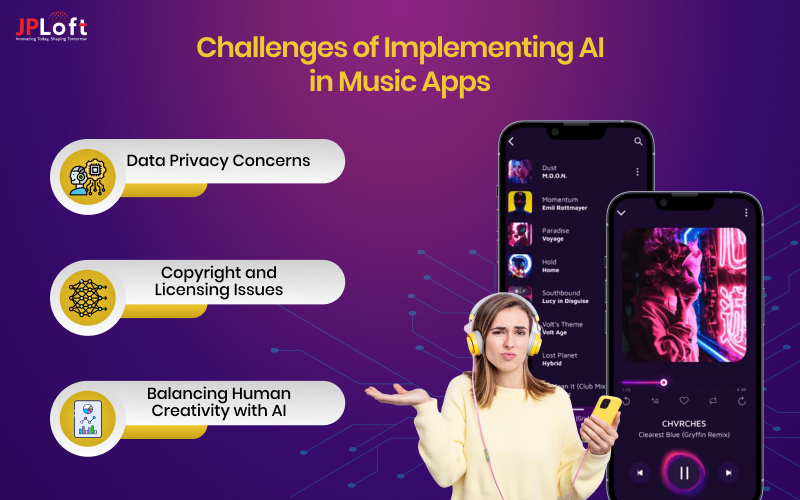
Whether you’re looking to create an AI music app or simply improve an existing one, here are some top challenges in music apps you’ll likely face:
1. Data Privacy Concerns
Just like any other app that collects user data, AI in music apps requires the handling of personal information.
From tracking listening habits to personal preferences, user data is important for AI to function effectively. However, privacy remains a top concern.
Make sure to keep your app compliant with privacy laws and ensure users feel their data is safe.
This is key when you develop an AI music app that users trust.
2. Copyright and Licensing Issues
When integrating AI into a music app, you need to navigate the tricky waters of copyright and licensing.
Whether AI is generating music or offering recommendations, these music app features must adhere to copyright laws to avoid legal issues.
Understanding the complexities of music licensing is a big concern to overcome, but it’s vital to ensure the smooth operation of the app as you look to build an AI music app that’ is innovative and compliant.
3. Balancing Human Creativity with AI
The AI music industry offers a vast range of capabilities, but one challenge lies ahead which is balancing AI with human creativity.
While AI can predict user preferences and create tailored playlists, it still lacks the emotional depth and nuance that human composers or artists bring to the table.
Remember, building a successful AI-powered music app requires not only overcoming challenges but also staying ahead of the curve.
Why Partner with a Development Company like JPLoft for AI Music Apps?
Building an AI-powered music app is not a piece of cake.
From integrating machine learning algorithms to ensuring a seamless user experience, the process needs technical expertise.
This is where partnering with a reliable development company can make all the difference. A professional company not only brings experience in integrating AI into music streaming apps but also understands the complexity of security and scalability.
This is why we suggest taking the help of the best music app development company, JPLoft to ensure your app is innovative, user-friendly, and ready for success in the competition.
Conclusion
The use of AI in music apps is undoubtedly changing the future of the music business.
With the ability to deliver customized experiences, create personalized playlists, and even create music from scratch, AI is transforming the way we find and engage with music.
From voice search to personalized suggestions to AI-powered artist discovery, music apps are getting smarter and easier to use, thanks to artificial intelligence.
If you're seeking to develop an AI music application, it is important to recognize the underlying technology that goes into such innovations as well as the challenges that you will likely encounter.
Collaborating with a trustworthy development organization, like JPLoft, will enable you to ride out this new technology and realize your vision of creating an AI-fueled music app.
FAQs
AI employs machine learning algorithms to scan your listening history and tastes, making music suggestions from the information.
The AI becomes more intelligent over time, adjusting the suggestions to better fit your tastes.
Yes, AI can create music. There are apps such as AIVA that employ AI to create original music, generating beats, lyrics, and even complete tracks in different genres.
This has made AI a useful asset for artists and music producers alike.
The biggest challenges are data privacy issues, copyright and licensing problems, and balancing human creativity with AI capabilities.
Making sure that user information is secure and that the app is in line with copyright regulations is vital to creating a successful AI music app.
A development company has the expertise required to implement AI properly into your music app.
They assist with technical issues, user interface design, security, and scalability to make your app competitive in a crowded market.
By continuously improving the AI capabilities in your app, including enhancing music suggestions, investigating new ways of discovering artists, and providing innovative features like mood-based playlists or voice searches.
Keeping up with the latest developments in AI and user feedback is essential to remain competitive.





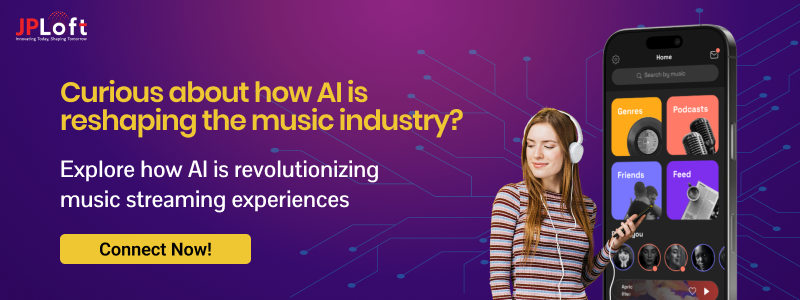
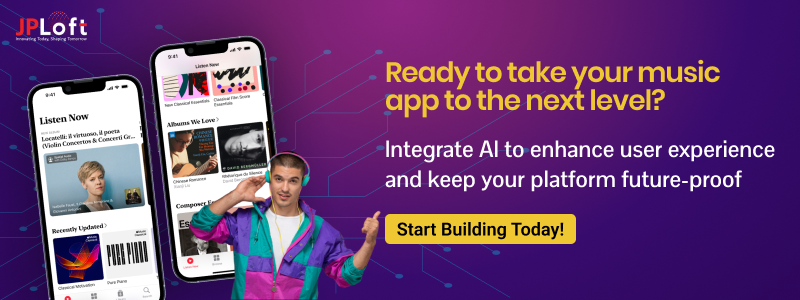

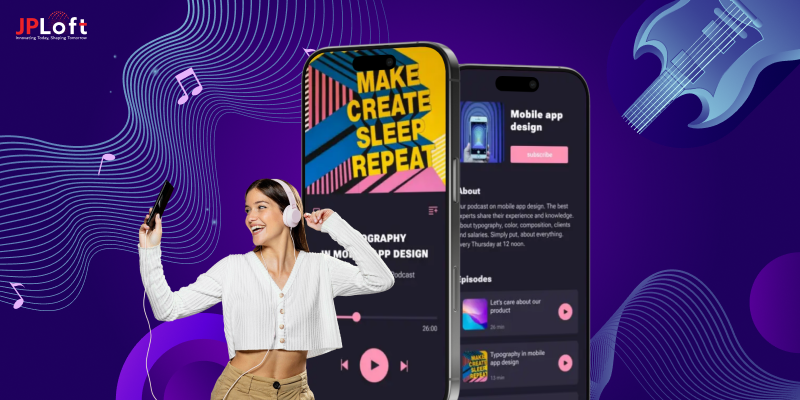
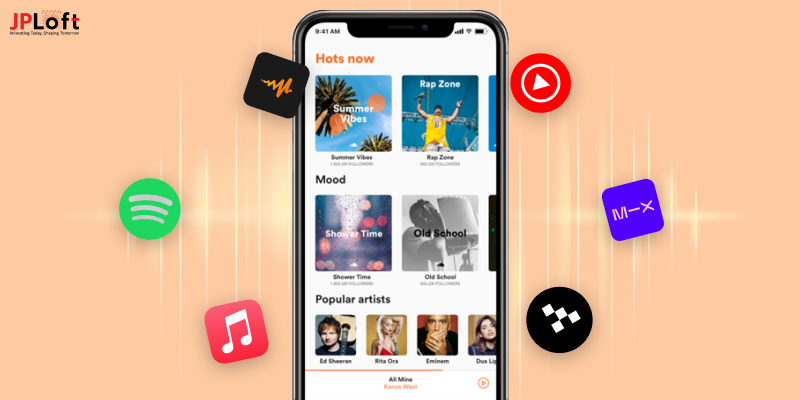
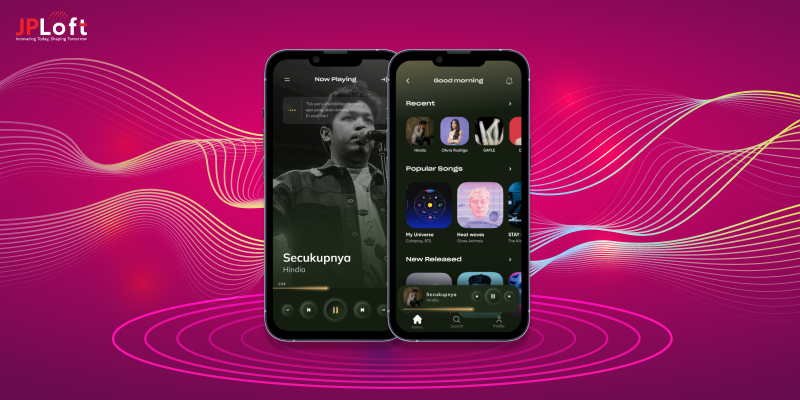



Share this blog